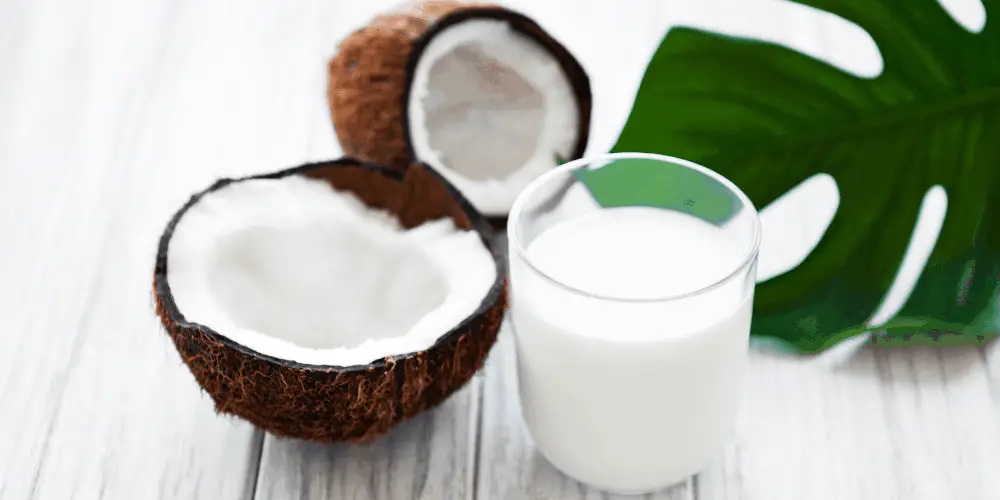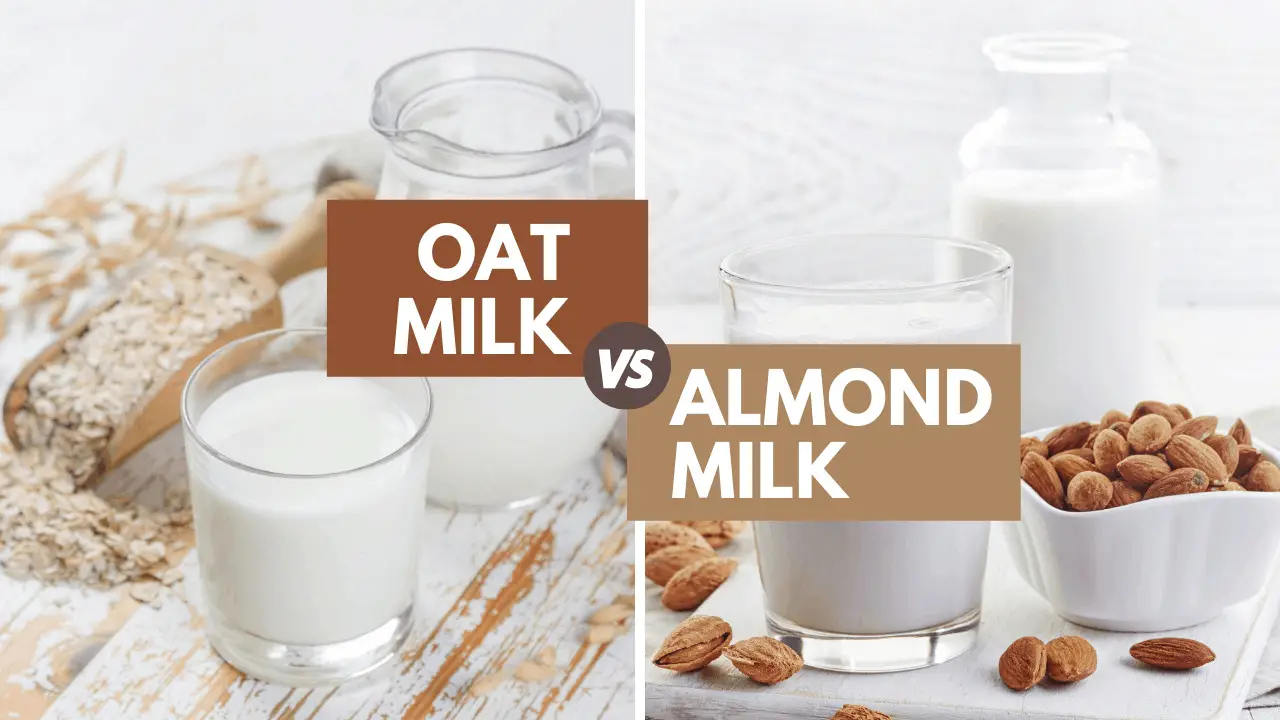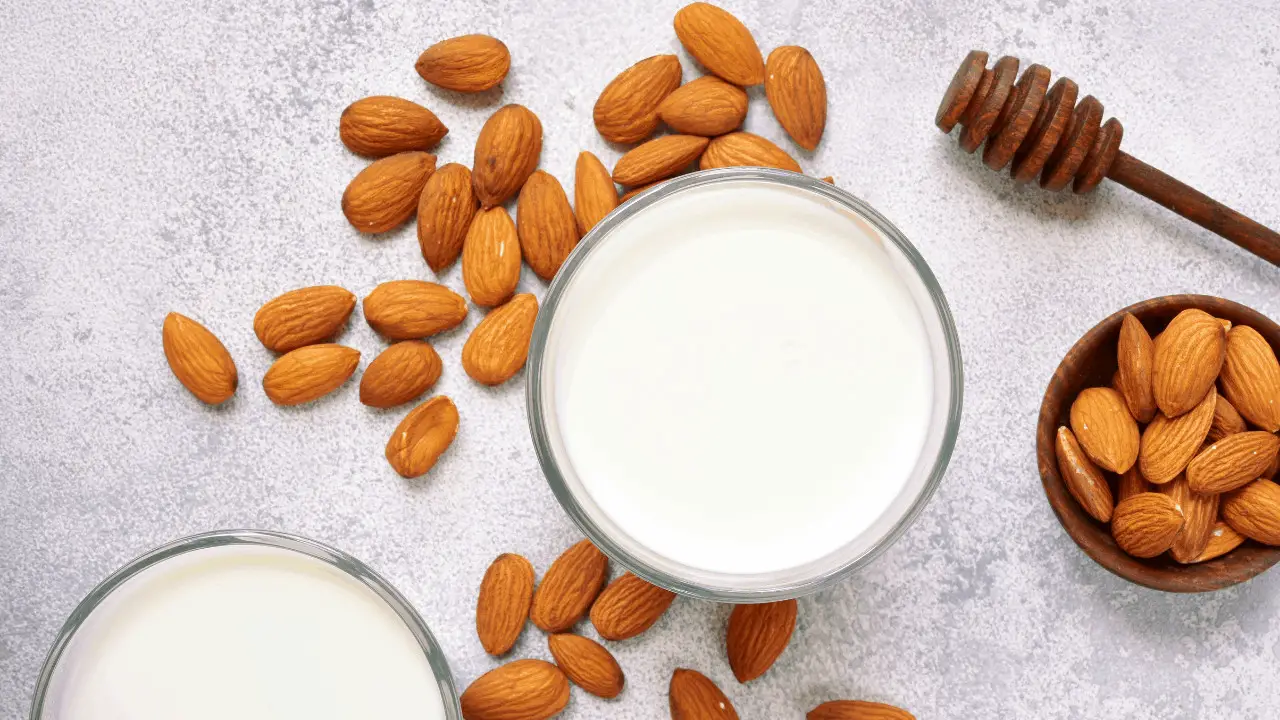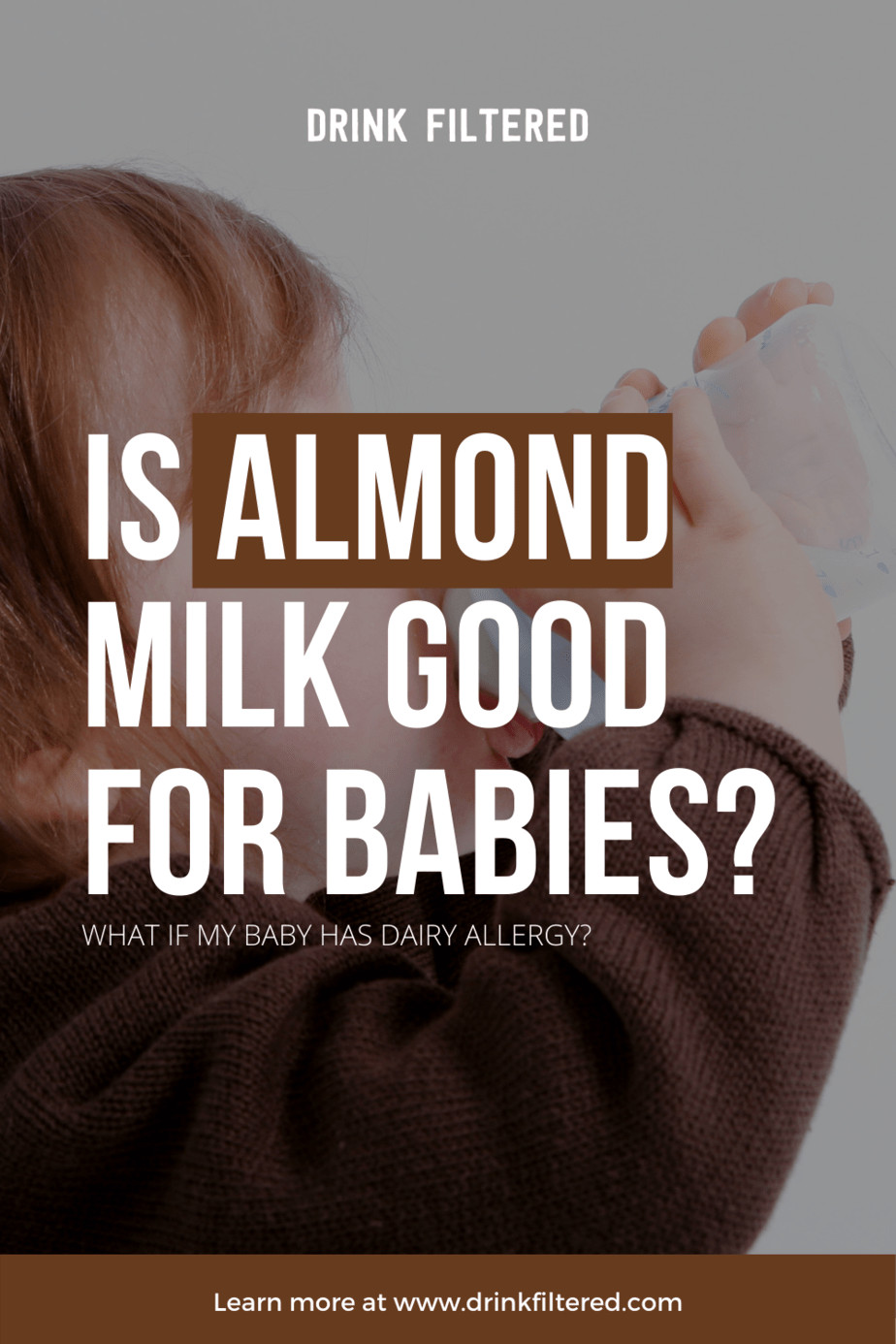With plant-based types of milk being everywhere these days, more people than ever are switching out cow’s milk for plant-based alternatives. Plant-based milk like soy, oat, and almond milk can be a great choice for those with a dairy allergy or intolerance, and at least in theory, they are supposedly better for the environment. For some parents, it may seem sensible to think about using plant-based milk like almond milk to feed their baby in its first months. But is this a good idea? Can babies have almond milk?
Babies and infants under 1 year old should be fed breast milk or infant formula for their nutrition, not plant-based milks like almond milk. Almond milk doesn’t contain the correct levels of fat, protein, calcium, and other vitamins and minerals to support your baby’s early development.
What Is Almond Milk?

With the clue very much in the name, almond milk is milk made from almonds that are soaked, ground, and strained, yielding a milky liquid.
As almonds are high in monounsaturated fats, the typical 4 oz. serving of almond milk contains around 1.5 grams of fat, as well as half a gram of protein, and around 20 calories. Almond milk also contains several key vitamins and minerals such as calcium, potassium, and vitamin D – but all of these, unless the brand is fortified, is fairly low as compared to cow’s milk.
Why Shouldn’t I Give My Baby Almond Milk?

If a baby is less than 1 year old, it should be drinking solely breast milk or formula. Although giving a baby almond milk seems like it could be a great choice, using it as an alternative to breast milk or formula can mean that the infant isn’t getting the essential nutrients it needs to grow in its first year.
Breast milk, in particular, contains the perfect blend of protein, fat, calcium, and other vitamins and minerals needed for a baby’s essential first few months and its early development – and formulas are specially made to emulate this.
Breast milk has also long been known to provide babies with a robust and long-lasting immune system, better resistance to allergies, and other health benefits that will last infants a lifetime. Attempting to swap out for almond milk, therefore, will leave the baby without access to these, meaning that they could be missing out on some vital positives in their development.
Feeding babies almond milk could also trigger an allergic reaction if the infant has a nut allergy – which can, of course, be quite serious. Always check with a pediatrician before introducing almond milk into any diet.
If My Baby Is Over 1 Year Old, Is Almond Milk Okay To Drink?

Children over 1-year-old can drink almond milk in small amounts, especially if it supplements an already otherwise healthy diet. After a baby’s first year, milk should be acting as a supplement as opposed to their sole source of nutrition. It is, therefore, important that they begin to try a variety of foods to make sure they get nutrients from a variety of sources.
That said, giving your child almond milk may not be the best milk alternative as it has a vastly different nutritional profile than cow’s milk. Take for example a 4 oz. serving of whole cow’s milk which is four times higher in fat than almond milk, and also contains almost triple the amount of calcium and a much higher level of potassium. As you can imagine, these are the nutrients vital for early growth in a child.
Cow’s milk is one of the most important sources of fat for a growing child— which is essential for proper brain development. Also, a lack of calcium increases the risk of poor bone health.
While almond milk can come fortified with calcium as well as other vitamins and minerals, the body generally finds these harder to process than if they come naturally. Additionally, many brands add a lot of added sugar in their plant-based milk, which can lead to excess sugar intake in babies and infants, risking other health issues.
Are there Other Milk Alternatives Better For My Baby?

All the plant-based milk alternatives are low in nutrients, and they all are fortified with mostly the same nutrients. Therefore, all of these milk alternatives are more or less similar. Ideally, none of these alternatives should completely replace breast milk or cow’s milk if there are no medical reasons to avoid them. Although these alternatives are fortified with nutrients, it’s not very well known if these fortified nutrients are absorbed and retained well in the body like the naturally occurring nutrients do.
Fortified soy milk is the only plant-based milk that is considered somewhat equivalent to cow’s milk. These are also a great option if your child is allergic to nuts. Do note that some children may also have soy allergies, though rare.
Other milk alternatives are not recommended by health professionals for children below 5 years as a complete milk replacement, since they are nutritionally quite inferior to cow’s milk. That said, other alternatives include rice milk, pea-based milk, coconut, and cashew milk. You can use these if your child is allergic to soy milk. But do keep in mind that there may be many nutritional consequences from a lack of nutrients, and your child’s diet should be adjusted so that they get all those nutrients that they generally get from cow’s milk for proper development.
Also, make sure that your toddler is not filling up on the milk alternatives, as they may not want to eat other food as a result— further promoting nutritional deficiencies.
For Children Plant Milks Will Be Nutritionally Inferior to Cow’s Milk
Some studies suggest that children who drink milk alternatives have many health issues, including shorter height when compared to children who drink cow’s milk.
There are also several cases of Kwashiorkor and other nutritional deficiency disorders (like rickets) that are coming up in recent times because of drinking milk alternatives in the developed countries—in both infants and children.
Additionally, total growth stunting (both height and weight) and even regression of developmental milestones have been found in these cases due to chronic nutritional deficiencies and relying too much on milk alternatives.
These issues are a matter of great concern, and this should be kept in mind while choosing a milk alternative for both your infant and toddler instead of cow’s milk when there are no medical indications for switching.
Always speak with a pediatrician before making these dietary changes for your child. You should choose your plant-based milk alternatives as per the recommendations of your child’s pediatrician.
Lastly, if you have to choose a milk alternative, go for a commercially produced unsweetened, fortified version. Home-made milk alternatives won’t have the fortified nutrients, and therefore, will have less nutritional value.
What If My Baby Has A Dairy Allergy?
If a baby’s suffering from a dairy allergy or lactose intolerance, the first port of call is to speak to a pediatrician. They can help advise the best options.
It may be that, if the baby’s still breastfeeding, the mother cuts out dairy from her diet – or, if a baby’s using a formula, it’s helpful to switch to a hypoallergenic version, to avoid any triggers.
If a baby’s over one year old, feeding it with fortified, unsweetened soy milk in accompaniment with other foods can help provide nutrition that is close to cow’s milk, including its protein content.
Using almond milk as an alternative to cow’s milk after the first year of an infant’s life is also certainly an option – but if so, make sure that the almond milk used is an unsweetened and fortified version, and consumed as part of a healthy and varied diet.
It’s important to note that only 2-3% of babies suffer from lactose intolerance, and quite a few grow out of it – so keep an eye on whether cow’s milk remains a problem and make sure to consult with a pediatrician regularly.
Conclusion
Babies and infants under one year old should be fed breast milk or formula exclusively. Any other kinds of milk – including almond milk – will not give the baby the levels of nutrition – from protein, fat, calcium, and other vitamins and minerals – that it needs in its first months.
When incorporated as part of a varied diet after a baby’s first birthday, almond milk is safe to drink, provided it’s an unsweetened, fortified version and there’s no allergy present. If possible, though, cow’s milk is the best choice for a 1-year-old, in terms of the nutrition it brings.








